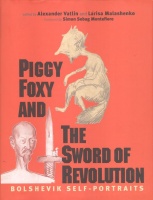categories
- Traffic and Vehicles Catalogue
- socreal.catalog
- Advertisement Catalogue
- Photo Catalogue
- Chinese and Japanese Catalogue
- New Holy Card Catalogue II.
- 12 interesting old books
 Books
Books
 Bibliophil
Bibliophil
 Antiques
Antiques
 Engraving
Engraving
 Maps
Maps
 Photos
Photos
 Antique Papers, Small Prints
Antique Papers, Small Prints
 Posters
Posters
- Circus
- Modern Graphics
- Socialist Realism
- NER Propaganda
- Others
cart
Cart is empty
You've not logged in
Vatlin, Alexander - Malashenko, Larisa (Editors), : Piggy, Foxy and the Sword of Revolution: Bolshevik Self-Portraits
- description
- additional information
Sketching on notebook pages, official letterheads, or the margins of various draft documents, prominent Soviet leaders in the 1920s and 1930s amused themselves and their fellows with drawings of one another. This book presents a selection of nearly 200 of these informal sketches, only recently uncovered in secret Soviet files. Funny, original, spontaneous, sometimes vicious or grotesque, the drawings and their accompanying notes are exceptionally revealing of the relationships and mindsets of the Bolshevik bosses at the time of Stalin's rise to power. The album's editors select characteristic drawings by such prominent leaders as Nikolai Bukharin, who depicts himself as 'piggy foxy', Valery Mezhlauk, and Stalin himself, whose recognizable blue pencil remarks appear on some of the works. A number of drawings of unknown authorship are also included. The editors identify the political issues, specific events, or discussions that inspired the drawings, and they provide biographical information about the people who drew and were drawn. The book opens a unique window on Stalin's inner circle, allowing us special access to the powerful men who, despite living in a humourless epoch, developed a special humour of their own.
About the Author
Alexander Vatlin is senior research fellow, the History Department of Moscow State University. He is also co-founder and vice president of the Russian Association for Research in Modern Russian History. Larisa Malashenko is researcher at the Russian State Archive of Social and Political History (RGASPI), Moscow.










 Telefon:
Telefon: E-mail:
E-mail:







